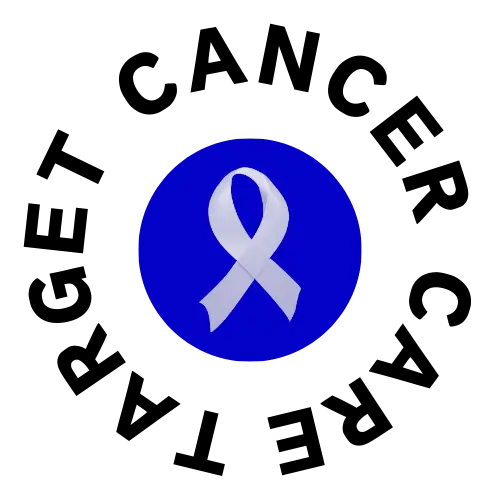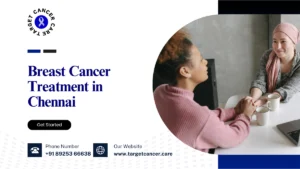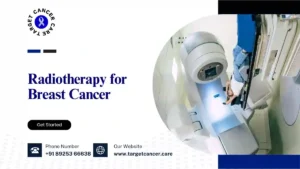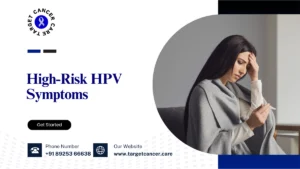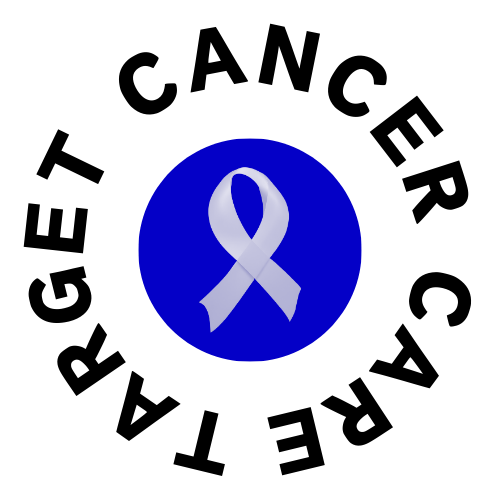Cancer remains one of the most pressing health challenges globally, affecting millions every year. Understanding the causes of cancer is crucial for prevention and early detection. This blog explores the causes of cancer, shedding light on lifestyle choices, genetic factors, and environmental influences. At Target Cancer Care, we are dedicated to empowering individuals with knowledge and resources to make informed decisions about their health.
Cancer remains one of the leading causes of death globally, affecting millions of lives every year. By understanding its causes, we can take proactive steps toward prevention and early detection. In this blog, we’ll explore the causes of cancer, delve into associated risk factors, and dispel common misconceptions to arm you with actionable knowledge.
What is Cancer?
Cancer occurs when abnormal cells grow uncontrollably in the body, invading healthy tissues and potentially spreading to other parts of the body. Unlike normal cells, cancer cells don’t stop growing and don’t die as they should. This growth leads to tumors or other severe health issues. Recognizing 8 signs of cancer is key to intervening before it spreads.
Types of Cancer
There are many types of cancer, each named after the part of the body where it begins. Common types include:
- Breast Cancer: Affects breast tissue and is more common in women but can occur in men. Cancer symptoms in women often include a lump in the breast, changes in breast shape, or unusual nipple discharge. Regular mammograms are key to early detection and can identify 8 early signs of cancer related to breast tissue.
- Lung Cancer: Often linked to smoking, it impacts the lungs and respiratory system. Symptoms may include a chronic cough, wheezing, and shortness of breath.
- Prostate Cancer: Primarily affects men and targets the prostate gland. Early signs include difficulty urinating, blood in urine, or discomfort in the pelvic area. These are examples of what are 8 warning signs of cancer in men.
- Skin Cancer: Caused by excessive exposure to UV rays. Watch for moles that change shape, size, or color. Using sunscreen regularly can be a preventive step against 8 signs of cancer affecting the skin.
- Colorectal Cancer: Found in the colon or rectum. Symptoms include persistent changes in bowel habits, blood in stool, and abdominal discomfort. Screening with a colonoscopy is highly effective in detecting 8 early signs of cancer in the digestive system.
Each type has specific symptoms, but knowing what are 8 warning signs of cancer can guide you toward early detection.
What are the Causes of Cancer?
Cancer is a complex disease influenced by a variety of factors. Recognizing these factors can help us take proactive steps towards reducing our risk:
- Genetic Factors: Some individuals inherit gene mutations that can significantly increase their risk factors for cancer.
- Lifestyle Choices: Decisions regarding diet, physical activity, and substance use play a critical role in cancer development.
- Environmental Factors: Exposure to certain pollutants and chemicals can elevate cancer risk.
By understanding these elements, we can adopt healthier lifestyles and engage in preventive measures.
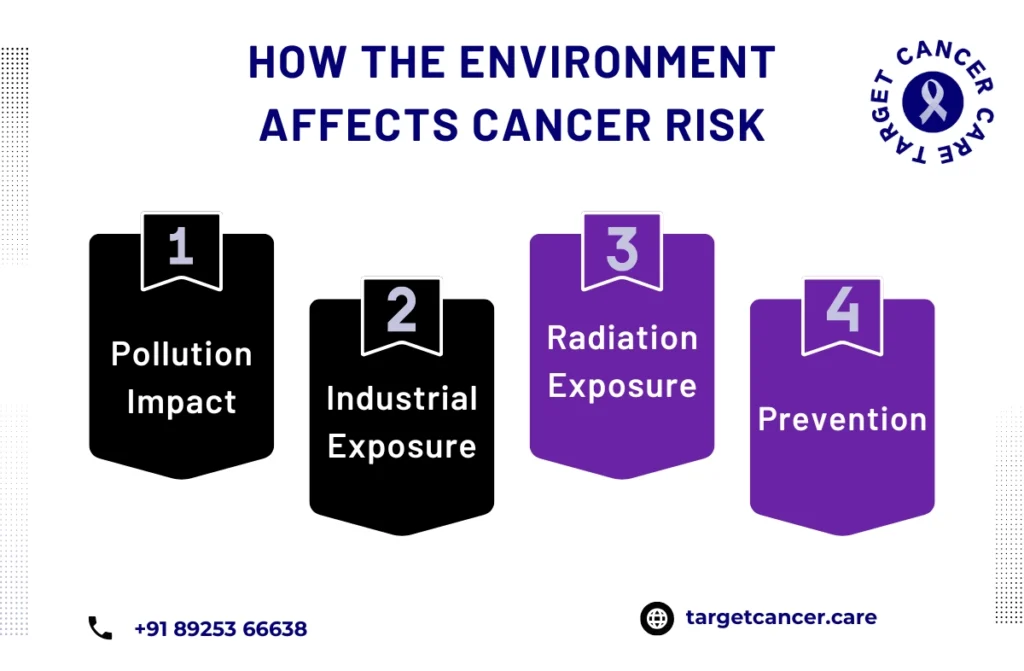
Top 10 Causes of Cancer
Cancer is a complex disease influenced by a combination of lifestyle, environmental, and genetic factors. Understanding these causes can help in developing better preventive strategies. This guide explores the Top 10 Causes of Cancer to help you become more aware of potential risks—some of which are preventable, while others are uncontrollable risk factors for cancer.
🧬 Genetics
Genetic mutations passed from parent to child can significantly increase your cancer risk. Hereditary cancers such as breast, ovarian, and colon cancer are often caused by mutations in genes like BRCA1, BRCA2, or TP53. These mutations impair your body’s ability to repair DNA or control cell growth, leading to abnormal cell division.
- Genetic counseling and testing are crucial for those with a family history of cancer.
- Proactive measures like regular screenings and preventive surgeries can reduce risks.
👉 Since genes cannot be changed, genetics ranks among the uncontrollable risk factors for cancer.
🚬 Tobacco Use
Tobacco use is the leading preventable cause of cancer worldwide. It introduces thousands of harmful chemicals into the body, including at least 70 known carcinogens.
- Smoking causes 80–90% of all lung cancer deaths.
- It’s also linked to cancers of the bladder, throat, pancreas, and kidneys.
Even secondhand smoke significantly raises cancer risk. Quitting smoking not only reduces your cancer risk but also improves overall lung and heart health.
🍔 Diet
A poor diet filled with processed meats, excessive red meats, saturated fats, and sugar increases cancer susceptibility.
- High salt and nitrates in processed foods are linked to stomach cancer.
- Low fiber intake can contribute to colorectal cancer.
A cancer-preventive diet includes:
- Fruits, vegetables, whole grains, lean proteins
- Antioxidant-rich foods like berries and leafy greens
- Reduced red meat and alcohol consumption
Eating well plays a central role in minimizing the Top 10 Causes of Cancer.
🛋️ Physical Inactivity
A sedentary lifestyle contributes to obesity, insulin resistance, and hormonal imbalances—all of which can increase cancer risk.
- Inactivity is strongly associated with breast, endometrial, and colon cancers.
- Regular exercise lowers inflammation, boosts immunity, and helps manage weight.
Just 30 minutes of moderate activity daily—like walking, cycling, or swimming—can dramatically lower your chances of developing cancer.
🍷 Alcohol Consumption
Alcohol is classified as a Group 1 carcinogen by the International Agency for Research on Cancer (IARC).
- It can increase the risk of breast, liver, colorectal, and esophageal cancers.
- Alcohol converts to acetaldehyde in the body—a toxic compound that damages DNA.
Risk increases with the amount and duration of alcohol consumed. Reducing or eliminating alcohol is one of the easiest ways to protect against cancer.
☢️ Radiation Exposure
Radiation damages the DNA in cells, leading to mutations and cancer over time.
- UV radiation from the sun is the leading cause of skin cancer, including melanoma.
- Ionizing radiation from X-rays or radon gas can cause leukemia and thyroid cancer.
- Occupational exposure in mining or radiology can also elevate cancer risk.
Protection strategies include:
- Wearing sunscreen with SPF 30+
- Minimizing unnecessary imaging
- Using protective gear when working with radiation
🌫️ Air Pollution
Outdoor and indoor air pollution have been linked to lung cancer and other respiratory diseases.
- Pollutants like PM2.5, diesel exhaust, and industrial emissions are classified as carcinogens.
- Long-term exposure can cause cellular inflammation, DNA mutations, and oxidative stress.
Solutions include using air purifiers, reducing outdoor exposure on high pollution days, and advocating for clean energy alternatives.
🦠 Infections
Certain viral and bacterial infections are associated with increased cancer risk.
- Human Papillomavirus (HPV) – Cervical, throat, anal cancers
- Hepatitis B & C – Liver cancer
- Helicobacter pylori – Stomach cancer
- Epstein-Barr Virus (EBV) – Nasopharyngeal and lymphomas
Vaccines, safe sex practices, and antibiotics for bacterial infections are effective preventive measures. Infection-related cancers are more common in low-income countries but can be managed with proper public health efforts.
🧴 Household Chemicals
Everyday products often contain carcinogenic chemicals that increase cancer risk over long-term exposure.
- Pesticides, cleaning sprays, air fresheners, and plastics may contain endocrine disruptors or volatile organic compounds (VOCs).
- Repeated exposure through inhalation, skin contact, or ingestion increases risk.
Tips to reduce exposure:
- Switch to eco-friendly or certified non-toxic products
- Ventilate indoor areas regularly
- Avoid heating food in plastic containers
🎂 Age
Age is among the most influential uncontrollable risk factors for cancer. As we grow older:
- DNA mutations accumulate.
- The immune system weakens.
- Cell repair mechanisms become less effective.
Most cancers are diagnosed after age 50, with risk continuing to rise with age. While aging cannot be avoided, early screenings and regular health check-ups are critical for timely detection and intervention.
Inherited Gene Mutations vs. Acquired Mutations
Cancer can arise from two main types of gene mutations:
- Inherited Mutations: These are genetic changes passed down from parents to children and are present from birth. They can predispose individuals to specific cancers, particularly when there is a family history.
- Acquired Mutations: These mutations occur after birth due to environmental exposures, lifestyle choices, or random errors during cell division. While inherited mutations cannot be changed, acquired mutations can often be mitigated through healthier living.
Recognizing the difference between these two types of mutations empowers individuals to make informed health decisions.
Behavioral and Lifestyle Factors Contributing to Cancer
Behavioral choices can greatly influence cancer risk. By adopting healthier habits, individuals can significantly reduce their likelihood of developing cancer:
- Tobacco Use: Quitting smoking and avoiding tobacco products are essential for cancer prevention.
- Diet: Eating a balanced diet rich in fruits, vegetables, and whole grains can lower cancer risk.
- Alcohol Consumption: Limiting alcohol intake can help reduce the risk of several cancers.
- Physical Activity: Regular exercise plays a vital role in cancer prevention and overall health.
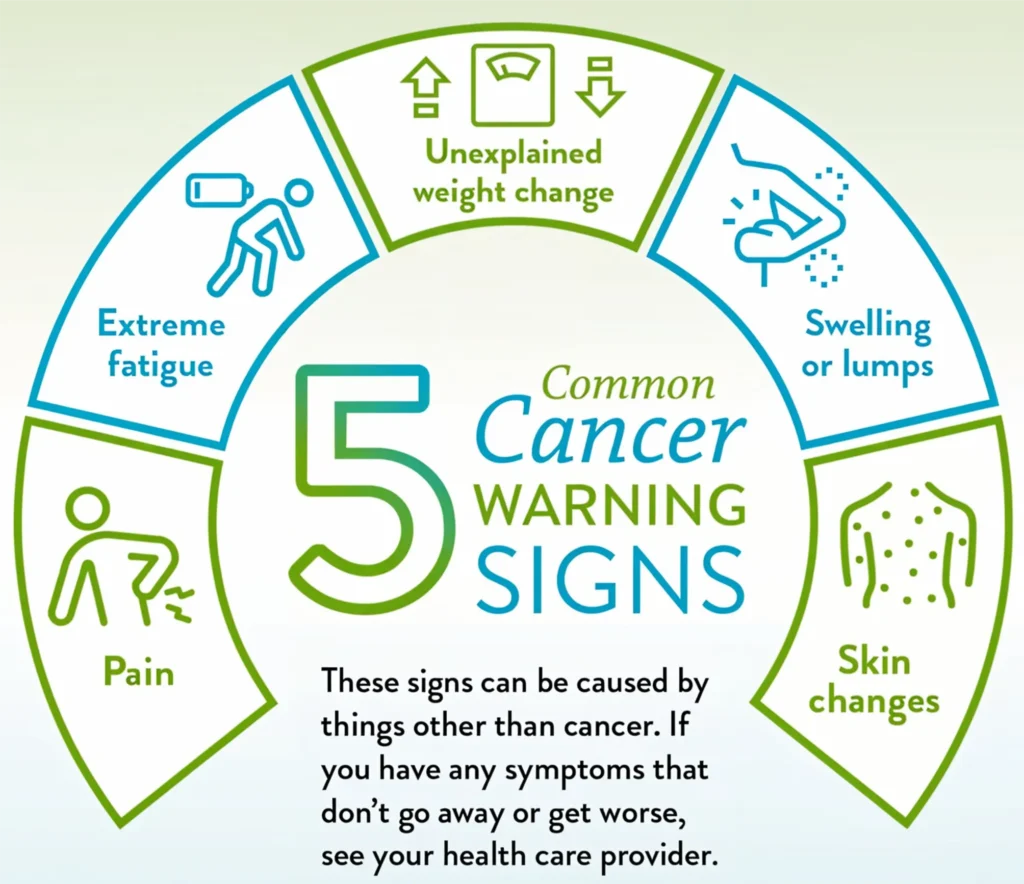
The Impact of Environment on Cancer Risk
Your living and working environment can contribute to cancer risk. Factors such as air quality, exposure to industrial chemicals, and even workplace hazards should be considered:
- Polluted Areas: Urban areas with high pollution levels are linked to respiratory cancers.
- Industrial Exposure: Jobs involving exposure to harmful substances, such as asbestos or certain chemicals, can increase cancer risk.
- Radiation Exposure: Certain occupations with high radiation exposure, like those in the nuclear industry, pose additional risks.
Being aware of these environmental factors allows individuals to take proactive steps to minimize exposure.
Do Infections Play a Role in Cancer Development?
Yes, specific infections are linked to various types of cancer. Chronic infections can lead to cellular changes that increase cancer risk:
- Human Papillomavirus (HPV): Associated with cervical and some throat cancers.
- Hepatitis B and C: Linked to liver cancer.
- Helicobacter pylori: Known to increase the risk of stomach cancer.
Preventive measures, including vaccinations and practicing safe habits, can help lower the risk of infection-related cancers.
Cancer Syndromes
Cancer syndromes are inherited genetic conditions that increase a person’s risk of developing cancer. These syndromes occur due to mutations passed down through families, making some individuals more susceptible to certain types of cancer.
Common Cancer Syndromes:
- Lynch Syndrome – Increases the risk of colon, endometrial, and ovarian cancers.
- BRCA1 & BRCA2 Mutations – Linked to breast and ovarian cancer.
- Li-Fraumeni Syndrome – Increases the risk of multiple cancers at a young age.
- Familial Adenomatous Polyposis (FAP) – Leads to a high risk of colorectal cancer.
While genetic factors play a role, protective factors of cancer can help reduce risks. These include a healthy diet, regular exercise, and avoiding tobacco. Understanding protective factors of cancer helps individuals with cancer syndromes take preventive measures and undergo early screening for better outcomes.
Protective Factors of Cancer
Protective factors of cancer refer to lifestyle choices, habits, and medical interventions that help lower the risk of developing cancer. Maintaining a healthy diet rich in fruits, vegetables, and whole grains can significantly reduce cancer risks. Regular physical activity strengthens the immune system and regulates hormone levels, further lowering the chances of developing cancer.
Another important protective factor is avoiding tobacco and alcohol consumption, as these substances are linked to various cancers, including lung, liver, and throat cancer. Vaccination against viruses, such as the HPV and Hepatitis B vaccines, helps prevent cancers caused by infections. Regular health screenings and early detection tests, like mammograms and colonoscopies, also play a vital role in preventing cancer progression.
While some uncontrollable risk factors for cancer like genetics and age cannot be changed, adopting these protective factors of cancer can greatly minimize the overall risk and promote long-term health.
Do Viruses or Bacteria Cause Cancer?
Yes, certain viruses and bacteria can contribute to cancer development by altering cellular DNA and triggering chronic inflammation. Human papillomavirus (HPV) is one of the most well-known cancer-causing viruses, responsible for cervical, anal, and throat cancers. Similarly, Hepatitis B and C viruses (HBV and HCV) increase the risk of liver cancer by causing long-term liver inflammation.
Helicobacter pylori (H. pylori) is a bacterial infection linked to stomach cancer. This bacterium affects the stomach lining, leading to ulcers and, in some cases, cancer. Other viruses, such as the Epstein-Barr virus (EBV) and Human T-cell leukemia virus (HTLV-1), have also been linked to lymphoma and leukemia.
Although these infections contribute to cancer risk, practicing good hygiene, getting vaccinated, and seeking early treatment for bacterial or viral infections can help reduce the chances of cancer caused by microorganisms. Understanding these risk factors alongside protective factors of cancer can improve overall prevention strategies.
8 Warning Signs and Symptoms of Cancer
Spotting the 8 signs of cancer early can be life-saving. Pay close attention to the following warning signs:
- Unexplained Weight Loss: Losing weight without trying is often one of the 8 early signs of cancer. If you’ve dropped 10 pounds or more without changing your diet or activity level, it’s time to consult a doctor. This could be linked to cancers like stomach, pancreas, or lung cancer, where the body’s metabolism is altered, highlighting Early cancer symptoms.
- Persistent Fatigue: While everyone feels tired sometimes, extreme fatigue that doesn’t improve with rest could indicate cancers like leukemia or colon cancer. This fatigue may be caused by the body using extra energy to fight the disease. It is also one of what are 8 warning signs of cancer worth noting.
- Lumps or Swelling: A lump under the skin, particularly in areas like the breast, testicles, or lymph nodes, is one of the Early cancer symptoms and should never be ignored. Lumps that are painless, firm, and steadily growing need immediate medical attention.
- Changes in Skin: Look for new moles, unusual growths, or changes in existing moles. Skin that becomes yellowish, darkened, or red can also signal certain cancers. These are examples of 8 early signs of cancer that can be caught during regular dermatological checkups.
- Chronic Pain: Persistent pain, particularly in the back or head, might be a symptom of cancer spreading to the bones or other areas. Chronic pain that doesn’t respond to usual treatments should not be overlooked. This symptom is one of the critical 8 signs of cancer that requires evaluation.
- Unusual Bleeding or Discharge: Blood in stool, urine, or coughing up blood could indicate cancers of the digestive or respiratory tract. Cancer symptoms in women may also experience abnormal vaginal bleeding, which could signal cervical or uterine cancer. These are classic examples of what are 8 warning signs of cancer.
- Difficulty Swallowing: Struggling to swallow may be one of what are 8 warning signs of cancer related to throat or esophageal cancer. It’s often accompanied by unintentional weight loss or chest pain.
- Changes in Bowel or Bladder Habits: Diarrhea, constipation, or blood in your urine are critical warning signs to discuss with your doctor. Persistent changes lasting more than a few weeks warrant immediate medical evaluation. These symptoms are often counted among 8 signs of cancer worth investigating.
These 8 early signs of cancer are your body’s way of signaling something might be wrong. Never ignore them.
10 Common Early Signs You Don’t Have Cancer
Let’s break down some signs that may suggest you don’t have cancer. Remember, it’s always good to talk to a doctor, but not every change in your body means something serious.
Long-lasting Symptoms: Why It’s Not Cancer
If you’ve had the same mild symptoms for years, chances are it’s not cancer. Cancer usually gets worse with time. If something stays the same or comes and goes, it’s probably due to:
- Allergies
- Digestive issues
- Hormonal changes
Signs You Don’t Have Cancer include stable symptoms that don’t grow or spread.
Not All Breast Lumps Are Cancerous
Many women and even men find lumps in their chest or breast. But not all lumps mean cancer:
- Cysts (fluid-filled sacs)
- Fibroadenomas (benign lumps)
- Hormonal changes
These are common in both young and older people. If a lump is soft and moves, it’s often not dangerous.
Breast Pain: When It’s Not Cancer
Breast pain can be worrying, but it’s rarely the first sign of cancer. Most breast cancers don’t hurt. Breast pain often comes from:
- Your period
- Cysts
- Muscle strain
In both Signs you don’t have cancer male and female, breast pain is often due to harmless reasons.
Intermittent Symptoms: Cancer vs. Common Issues
Do your symptoms come and go? Cancer usually doesn’t do that. It keeps growing and causing more problems. If symptoms vanish for days or weeks:
- They might be stress-related
- Could be seasonal allergies
- Might be diet or sleep-related
These are Signs that suggest you don’t have cancer.
Headaches: When to Worry About Cancer
Most headaches are just that—headaches. They come from:
- Tension
- Dehydration
- Eye strain
Cancer headaches often come with other problems like vision loss or vomiting. If none of those happen, it’s probably not serious.
For Non-Smokers or Secondhand Smokers: Understanding Cancer Risks
If you’ve never smoked and don’t live around smokers, your lung cancer risk is very low. Plus, your body often gives Warning signs of cancer in your body like coughing up blood or weight loss. If you’re feeling healthy and breathing fine, you likely don’t have cancer.
Constipation: A Common Issue, Not a Cancer Symptom
Constipation is annoying, but rarely a cancer sign. It usually happens due to:
- Diet changes
- Low water intake
- Lack of exercise
Unless it lasts for weeks with bleeding or weight loss, it’s not likely cancer. This is one of the Signs You Don’t Have Cancer that people often overlook.
Short-term Symptoms: Key Differences from Cancer Symptoms
If your symptoms last a few days and go away on their own, they’re likely due to:
- Infections
- Stress
- Minor illnesses
Cancer doesn’t just appear and disappear. The body shows strong and ongoing signs.
Age Factor & Cancer Risks
Cancer risk increases with age. If you’re young, especially under 30, most symptoms are unlikely to be cancer. Things like hormonal changes, infections, or injuries are far more common.
Still, regardless of age, Signs You Don’t Have Cancer can be spotted with good awareness.
Normal Health Reports: Why It’s Reassuring
If your blood tests, scans, and doctor check-ups come back normal, that’s a good sign. While no test is perfect, regular healthy reports mean your body is likely free from cancer.
These results are strong Signs you don’t have cancer female and male.
The 7 Stages of Cancer
The 7 stages of cancer illustrate how cancer progresses, from early abnormalities to advanced disease affecting multiple organs.
Stage 0: Carcinoma in Situ
- Abnormal cells are present but have not invaded surrounding tissues.
- This stage is highly treatable, often requiring localized therapies such as surgery or radiation.
Stage 1: Localized Cancer
- The tumor is small and confined to its original location.
- There is no spread to lymph nodes or distant organs. Surgery is usually effective at this stage.
Stage 2: Early Local Spread
- The tumor has grown larger and may have started invading nearby tissues or lymph nodes.
- Treatment may involve surgery, radiation, and chemotherapy.
Stage 3: Regional Spread
- Cancer has spread to surrounding tissues and regional lymph nodes.
- Aggressive treatments, such as systemic therapies, are often required to manage this stage.
Stage 4: Metastatic Cancer
- Cancer has spread to distant parts of the body, such as the lungs, liver, or bones.
- Treatment focuses on managing symptoms and slowing disease progression.
Stage 5: Advanced Complications
- While not officially part of the clinical staging system, this stage refers to cancers causing significant organ failure or systemic effects.
- Care typically emphasizes symptom relief and improving the patient’s quality of life.
Stage 6: Terminal Cancer
- At this stage, palliative care is the primary focus, ensuring the patient’s comfort and dignity.
Understanding these seven stages of cancer helps patients and families prepare for the challenges ahead and explore appropriate treatments.
Conclusion
Awareness of the top causes of cancer empowers individuals to take control of their health. By understanding both controllable factors, like lifestyle choices, and uncontrollable ones, such as genetics, we can work towards reducing cancer risk. Target Cancer Care is here to provide you with the knowledge, resources, and support necessary to make informed health decisions.
